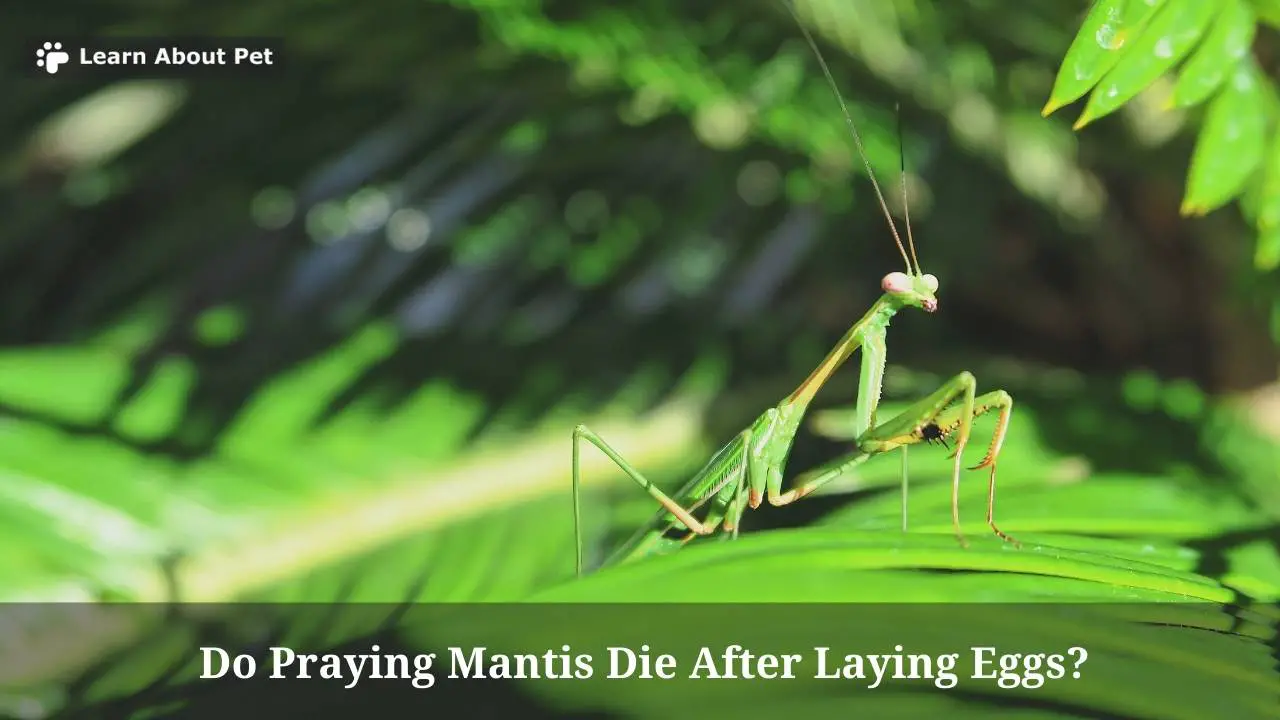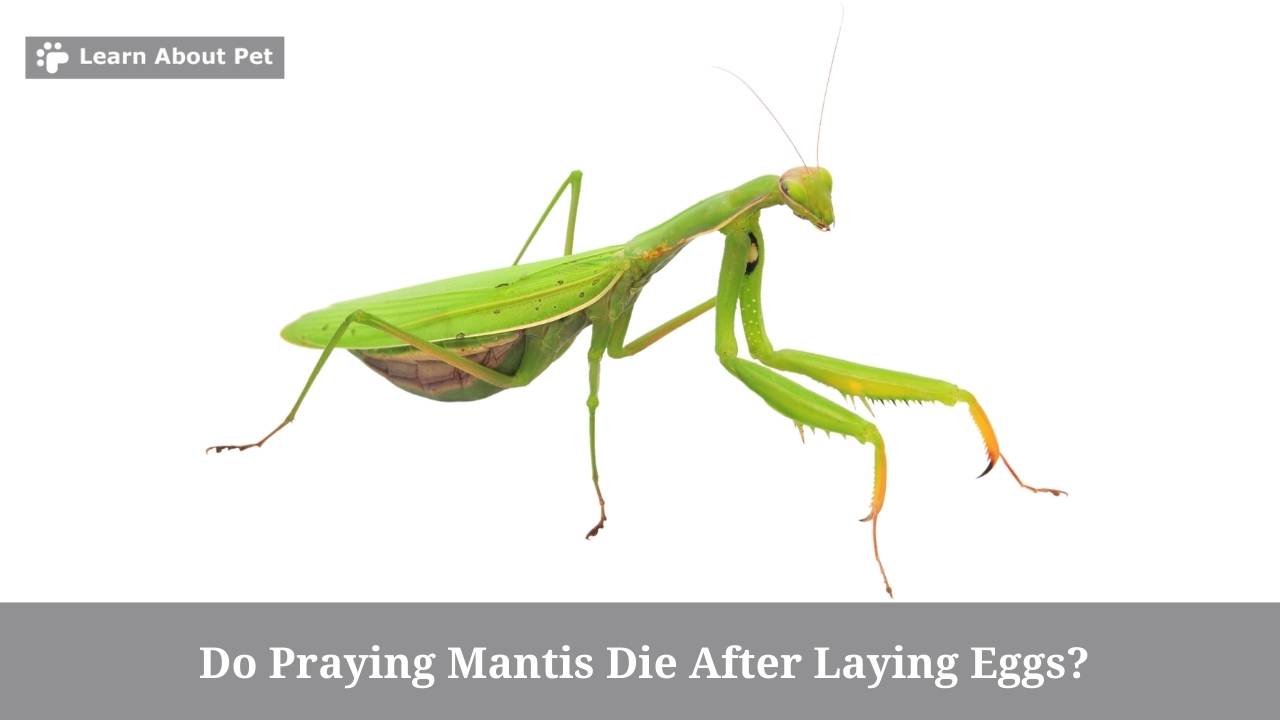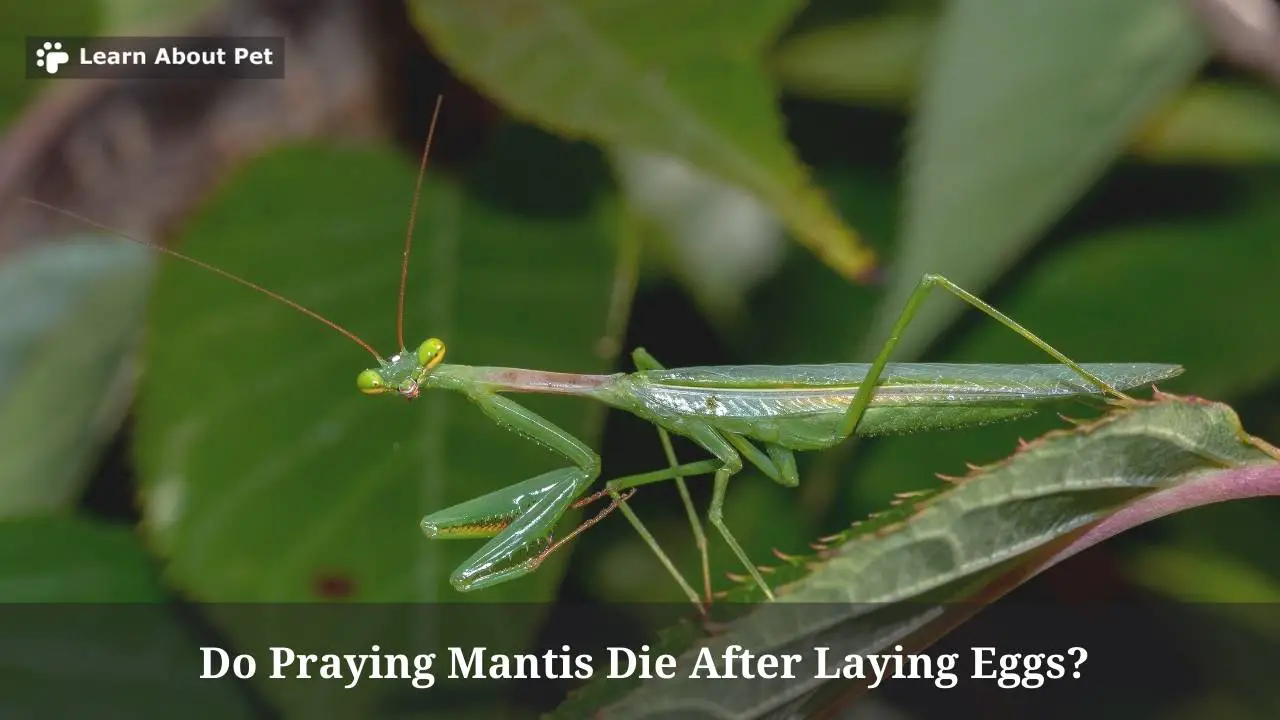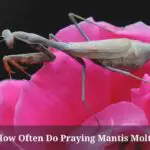One of the most frequently asked questions about praying mantises is on whether they die after laying eggs. In this article, we shall be exploring that subject – of whether mantises die after laying eggs.
Do praying mantis die after laying eggs? Yes, praying mantises typically die soon (within 2 weeks or so) after they finish laying eggs. The mantises usually lay the eggs close to the end of their lifespans, hence the subsequent death.
Thus it is not the act of praying mantis laying eggs per se that causes their death. Rather, it is the (coincidental) fact that the mantises tend to lay their eggs close to the end of their expected lifespans.
Consequently, by the time a mantis is laying eggs, it tends to be quite close to the end of its lifespan. The mantis’ death usually follows shortly after.

Normally, there is certain unique pregnant praying mantis behavior that precedes the laying of the eggs. Upon noticing this behavior, you need to start thinking of what do you do if a pet praying mantis starts laying eggs.
In due course, the pregnant mantis ends up laying the eggs. Then it dies shortly thereafter.
As we said, what makes the mantises die shortly after laying eggs is the fact that the egg laying usually coincides with the nearing of the mantises’ end of lifespans.
That brings about an interesting question, on when exactly the praying mantises lay eggs. So let’s start with that aspect.
When Do Praying Mantis Lay Eggs?
Praying mantises start laying eggs after reaching maturity. This is typically about a couple of weeks following their last molt into adulthood.
In the temperate parts of the world, the mantises’ egg laying season is usually that of late summer or early fall. So this is when you are likely to find praying mantises laying eggs.
Do Praying Mantis Die After Laying Eggs?
Praying mantises do tend to die shortly after they finish laying eggs. However, the mantis’ death is not instantaneous upon laying eggs. Indeed, some mantises get to lay eggs quite a number of times, before dying.
The general rule, however, is that within a couple of weeks after a mantis finishes laying eggs (after the last egg sac), it tends to die.
Many entomologists who study the life patterns of praying mantises do consistently note that trend: of the mantises dying after laying eggs. So it is something that happens.
People who keep praying mantises as pets also observe the said pattern: of the mantises dying after laying eggs. Therefore it is indeed something that happens.
Online and elsewhere, you often find people seeking to know, why do female praying mantis die after laying eggs? That only goes to show that this phenomenon – of the mantis dying after laying eggs – is one that is real.
The key thing to understand, however, is that the mantis’ death doesn’t happen instantly after egg laying. Yes, the mantis usually dies shortly after finishing the egg laying assignment.
But the death is not instant: such that the mantis would just drop dead right after laying eggs. In fact, some lay several egg sacs.
While going through praying mantis egg sac info, you often find that the different sacs were laid at different times. Yet they belong to the same mantis. And this means that the mantis laid several sacs.
Obviously, if it was a rule for the mantis to die instantly upon laying eggs, the laying of multiple sacs wouldn’t be possible.
The best way to put it is this: a mantis usually dies shortly after finishing the entire egg laying assignment.
How Long After Laying Eggs Do Mantis Die?
Having learnt that praying mantis really do die soon after they finish laying eggs, another interesting question comes up. That is on how long does a praying mantis live after laying eggs (or how soon thereafter does it die)?
As it turns out, praying mantises tend to die about two weeks after they finish laying eggs.
So with regard to when do praying mantis die after laying eggs, that is the answer: about two weeks.
Note that the reference here is not to the mantis dying two weeks after starting to lay eggs. On the contrary, the reference is to the mantis dying about two weeks after finishing laying eggs.
Thus a mantis may start laying eggs today. Then it lays a sac of eggs every few days. This may go on for several weeks. Thereafter, after the mantis finishes laying eggs, it may live for about 2 more weeks, and then it dies.
Why Do Praying Mantis Die After Laying Eggs?
So far, we have been saying that the praying mantises tend to die soon after laying eggs. This leads to a question on why does a praying mantis die after laying eggs.
Thus focus here is on the underlying reason.
Indeed, why does a female praying mantis die after laying eggs? The reason is simply because the laying of eggs in mantises tends to coincide with the end of their lifespans.
Thus by the time a mantis is laying eggs, the end of its life is already nigh. It tends to die shortly thereafter. You have to remember that these mantises don’t have particularly long lifespans.

There can also be a climatic aspect at play, in explaining why mantises die after laying eggs. In fact, it is also helpful in explaining why do adult praying mantis typically die when they have their offspring.
Here, it is important to understand that the egg laying/production of potential offspring in mantises coincides with late summer or early fall. Those are times when temperatures start dropping.
Now mantises really can’t cope with extremely low temperatures. Therefore as the temperatures fall (which also coincides with their egg laying), the mantises start dying off.
Further still, there is the fact that the foods that mantises feed on tend to become scarcer in later summer and early fall.
This may further contribute to the mantises dying then (which also coincides with their egg laying).
Thus the death after egg laying is coincidental. If you research on how do praying mantis die (and what comes out of a praying mantis when it dies), you realize that egg laying doesn’t directly cause the mantis’ death.
The egg laying just happens to typically coincide with the end of mantises’ lifespans.
Do All Praying Mantises Die After Laying Eggs?
Almost all praying mantises tend to die soon after laying eggs.
Usually, no mantis gets to live more than a few weeks after laying eggs.
Thus with regard to what happens after a praying mantis gives birth (lays eggs), one of the key things is that it tends to die shortly thereafter.
It is important to understand that the mantis eggs tend to have self-protective features (ootheca). Thus even after the parent mantises die, the eggs usually survive and go on to hatch.
The mantis’ hatchlings are also genetically encoded with the information necessary for their survival. They therefore don’t need their parents to teach them much.
In any event, these mantises tend to lay so many eggs that, whatever happens, at least a few hatchlings survive to keep the species going.
A mantis’ egg laying season is usually in late summer or early fall. And a praying mantis’ lifespan is, at most, one year. Thus no mantis would normally live for more than one egg laying season.
However, in the one season it lives, a mantis may lay several egg sacs.
How Many Times Can A Praying Mantis Lay Eggs Before Dying?
A praying mantis may lay up to 7 egg sacs, before dying. But this is usually within a single egg laying season. And once the mantis completes laying its egg sacs, it tends to die shortly thereafter: usually within 2 weeks.
Not all praying mantis get to lay 7 egg sacs though. 7 is just the usual upper limit. But some may lay fewer — sometimes only one or two egg sacs – before dying off.
The fact that the mantises can lay multiple egg sacs in a laying season is very relevant to our discussion. It only goes to show that it is not the egg laying act per se that causes mantises to die shortly after laying.
If egg laying per se was the cause of death, the death would be instantaneous after laying eggs. And the laying of multiple egg sacs wouldn’t therefore be a possibility.
Yet we see that a mantis can lay as many as 7 egg sacs, before eventually dying.
This buttresses the argument that the mantis’ dying after laying eggs is coincidental. It just happens that the mantises lay eggs near the end of their lifespans.
Moreover, the mantises lay their eggs just before the onset of cold weather, which is unfavorable to them.
It is worth noting that the deaths of female mantises soon after laying eggs also coincides with the death of any males that may have survived being eaten after mating.
Clearly then, it is the end of expectable lifespans, and the onset of unfavorable weather, that accounts for these deaths. Not egg laying per se.
Can You Prevent A Praying Mantis Dying After Laying Eggs
There is really not much you can do, to prevent a mantis dying after laying eggs.
As we said, the death of the mantises after laying eggs is largely due to the fact that the egg laying tends to coincide with the nearing of the end of the mantises’ lifespans.
Once a mantis’ lifespan is over, there is not much you can do to extend its life.
The best you can do, upon noticing that your mantis has started laying eggs, is to prepare for its likely demise. Thankfully, as noted earlier, the mantises normally don’t usually die instantly after laying eggs.
In fact, most go on to live for as long as 2 more weeks after finishing egg laying, before dying. You can get to spend quality time with the mantis within that duration, before its demise.
There may also be the option of taking good care of the hatchlings from the mantis’ eggs, to keep her lineage going…
Final Verdict – Do Praying Mantis Die After Laying Eggs
Praying mantises do tend to die soon after they finish laying their eggs.
Thus within a couple of weeks or so after a female praying mantis finishes laying eggs, she tends to die.
Egg laying in praying mantises tends to happen close to the end of the mantises’ lifespans. Thus it is not the egg laying act per se which causes female praying mantises to die soon after they complete laying eggs.
Rather, it is the fact that the egg laying mantises tend to be those that are near the end of their lifespans. So those tend to be mantises that would still have died at that time, even without the egg laying.
Dying after laying eggs is thus simply coincidental.
It is also worth noting that the mantises normally lay eggs in late summer or early fall. These are periods characterized by onset of low temperatures and scarceness of the foods that mantises eat.

Those factors also contribute to the coincidence of mantis deaths with their egg laying season.
Ultimately, if you notice that your pet praying mantis is laying eggs, you need to take this as a sign that the mantis may only have a couple or so weeks to live.
Praying mantises typically die within two weeks after they finish laying eggs.
As a pet lover, make sure to learn about pet more and give your pet mantis a good and comfortable life!

Welcome to Learn About Pet. My name is Rajkumar Ravichandran and I love all pets, travel, and amazing food. I write about my passion and personal experience caring for multiple pets in this blog! ❤️
Post Disclaimer
DISCLAIMER: THIS BLOG OR WEBSITE, "Learn About Pet", DOES NOT PROVIDE YOU WITH MEDICAL ADVICE AND IS NOT A SUBSTITUTE FOR MEDICAL ADVICE. ALWAYS GET IN TOUCH WITH YOUR PERSONAL VETERINARIAN AND USE INFORMATION HERE AS GENERAL ADVICE.
The information, including but not limited to, text, graphics, images and other material contained on this website are for informational purposes only. No material on this site is intended to be a substitute for professional veterinary advice, food recommendation, diagnosis, or treatment. Always seek the advice of your veterinarian or other qualified health care provider with any questions you may have regarding a medical condition or for pet food related questions.







